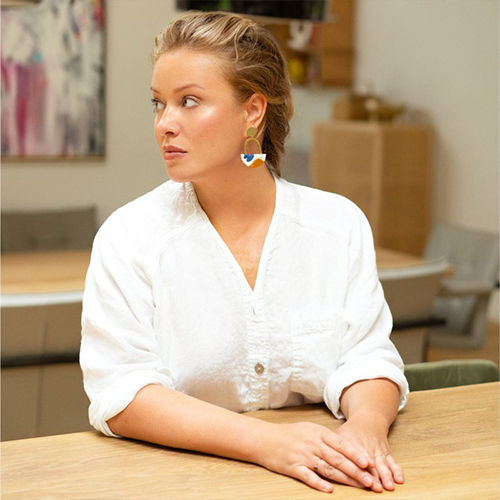
Simona Rimkiene
Co-Founder
Label - Not Perfect Linen
The beauty of linen is that it is not perfect
Inspired by simplicity and imperfection of linen, the family-run brand ‘Not Perfect Linen’ is everything about ensuring quality, promoting transparency, enforcing sustainable practices, and doing everything as ethically as possible. In an interview with Fibre2Fashion, Co-founder Simona Rimkiene talks about the linen business.
Fibre2Fashion: What attracted you towards the fashion industry and motivated you to start your own brand?
Simona Rimkiene:
My mother started working with textiles when I was a baby. She is an engineer by profession but had lost herself in sewing, creating, and designing. I have grown up among fabrics and patches, always feeling that wonderful smell of the brand-new fabric. It is the smell of my childhood!
F2F: Since your entire family is involved in running the business, how do you maintain a balance between personal and professional life?
SR:
There is actually no balance between professional and personal life within our family. We talk about work during the holiday, family gatherings, or even on evening phone calls. Again, though, I see it as a strength, not a burden. How else would you get up at night to help a customer to track the order? It really helps our business grow as we can develop new ideas. As family members, we are not afraid to point out one’s weaknesses or directly ask for help if needed.
F2F: How would you define the aesthetics and vibe of your clothing?
SR:
We are mostly inspired by linen simplicity and its imperfection. The beauty of linen is that it is not perfect. If you keep trying to iron it, you will definitely miss the beauty of it. Linen needs to be used and it gets better with age. Linen pieces can be compared to old English leather shoes or old mechanical Swiss watches – all these things are not new or perfect but are definitely more valuable than any new.
F2F: Of all the various fabric materials, why only linen?
SR:
If you love linen, linen loves you back. Linen is a travel saver while being breathable and highly absorbent. In addition, it is recyclable and biodegradable. Though it might seem expensive at first sight, it saves you money as you need fewer clothes due to its strength and durability.
F2F: Where do you source your materials from?
SR:
We source the best European linen available. The material we use is OEKO- TEX Standard 100 certified, and it is produced entirely in Europe from the fields to the fabric. It also means that the linen fabric has been tested for harmful substances and guarantees that only the low-impact dyes were used, and that the dyed linen fabric meets human-ecological requirements.
F2F: There are so many sustainable and slow fashion-based brands in the market today. What makes your brand stand out?
SR:
While creating our brand we all unanimously decided to adopt a quality-oriented slow fashion approach and voice our sustainable decision. It was and is important that together with our customers we can make an outsized positive impact on the sustainability agenda and shape our world.
F2F: What significant changes in the fashion industry would you like to see practically, and also in terms of fashion education?
SR:
We all would love to see fashion industry become safer, fairer, cleaner and more transparent. Working in line with demand and letting our conscious customers lead our entire manufacturing process is what we are proud of and see tremendous value in. Fast fashion brands must make 4-5 similar ready-to-wear garments to guess the customer’s needs; we, as a company, don’t need to question it at all. Each of our customers knows best what they need, and their conscious decisions on your capsule wardrobe (exact items, particular colours, preferred adjustments etc) are what really make the most positive environmental impact, as none of the garment is sent to landfills.
F2F: Sustainable clothing comes with a price. What is your comment?
SR:
Several factors come into play when we talk about sustainability and its value. First, when we give our money to the sustainable brand, we pay for a smaller footprint left behind on the ecosystem and pay a fair and equitable wage to the maker who made our garment. Second, trusting your funds to a sustainable brand usually means investing in quality raw materials and crafting.
F2F: Please suggest some styling tips to slay in a linen outfit.
SR:
As probably being the most colourful linen brand, we definitely have a tip! If there is a day when you will not be sure what to wear – wear colour! I have noticed for a long time that colour was severely lacking in many wardrobes even though it can do amazing things with the overall appearance.
F2F: What are the forthcoming plans with the label? Are you planning to expand?
SR:
The day Yvon Chouinard gave Patagonia back to Earth I made a post on Instagram that we want to be like Patagonia when we grow up. Why not to dream?

Arun Sirdeshmukh
Bill D’Arienzo
Abhay Gupta
Gabi Seligsohn
Rahul Mehta
Pradip Mehta
Anurag Batra
Aseem Prakash
Rahul Mehta
Fanny Vermandel


20230103183907.png)




_8.JPG)





